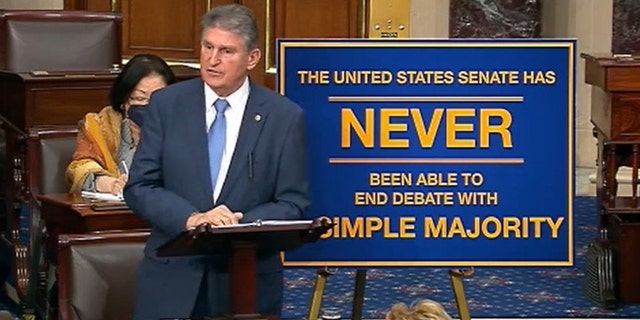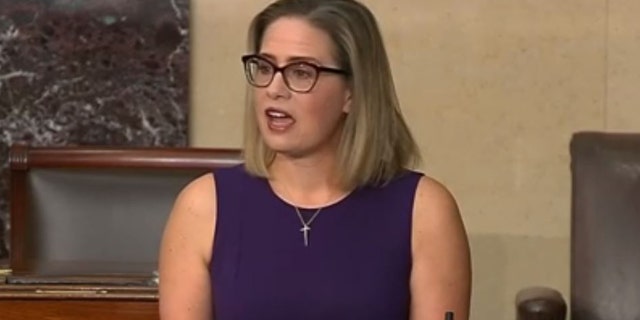
Dems’ ‘nuclear option’ push fails, election bills dead, after Sinema and Manchin vote to keep filibuster
Manchin, Sinema tanked ‘nuclear option’ vote
By Tyler Olson
Democrats‘ attempt to use a “nuclear option” to get around the filibuster for two major elections bills failed Wednesday after the gambit from Majority Leader Chuck Schumer was stymied by Sens. Joe Manchin and Kyrsten Sinema.
Manchin, D-W.Va., and Sinema, D-Ariz., joined all Senate Republicans in opposing the attempt to alter the Senate filibuster on party lines, resulting in a 48-52 final tally. That vote followed a failed attempt by Democrats to advance the election bills over the Senate’s 60-vote filibuster threshold. All Republicans opposed it.
Senate Majority Leader Chuck Schumer, D-N.Y., waits to speak during an event to mark one year since the U.S. Capitol insurrection on Capitol Hill in Washington, Jan. 6, 2022. (AP Photo/Susan Walsh, Pool) (AP Photo/Susan Walsh, Pool)
“A few hours ago this chamber, with the eyes of the nation upon it and with the evidence of vote suppression laid bare before it… took a vote to move to final passage on the Freedom to Vote Act and the John Lewis Voting Rights Advancement Act,” Schumer said on the Senate floor Thursday. “It received 50 votes, and with the vice president we would have had a majority.”
Schumer added: “Even if you think the filibuster is a good thing, is it protecting voting rights, and preventing their diminution more important?”
The filibuster change Schumer proposed would only apply to the elections bills the Senate was considering Wednesday. But it was nonetheless attempted using the partisan nuclear option Sinema and Manchin made clear repeatedly said they opposed – even though they support the underlying bills.
“These bills help treat the symptoms of the disease, but they do not fully address the disease itself. And while I continue to support these bills, I will not support separate actions that worsen the underlying disease of division affecting our country,” Sinema said last week.

Sen. Joe Manchin, D-W.Va., defends the Senate’s 60-vote filibuster in a floor speech on Jan. 19, 2022. (https://www.senate.gov/legislative/floor_activity_pail.htm)
“Allowing one party to exert complete control in the Senate with only a simple majority will only pour fuel on the fire of political whiplash and dysfunction that is tearing this nation apart,” Manchin, D-W.Va., said Wednesday. “Contrary to what some have said, protecting the role of the minority – Democrat or Republican – has protected us from the volatile political swings that we have endured over the last 233 years.”
A vote to defang of the filibuster – especially for election legislation – is years in the making after intense pressure from Democrat activists, lawmakers and more recently, President Biden.

Schumer’s nuclear option attempt Thursday marked the third time it’s been tried in the last decade. Late Majority Leader Harry Reid, D-Nev., was the first to use it during former President Barack Obama’s term. That time it was for presidential nominees with the exception of Supreme Court justices.

Sen. Kyrsten Sinema, D-Ariz., delivers remarks on the Senate floor in support of the legislative filibuster, on Thursday, Jan. 13, 2022.
Minority Leader Mitch McConnell, R-Ky., used the nuclear option to lower the filibuster threshold for Supreme Court nominees in 2017 when Democrats filibustered the nomination of Justice Neil Gorsuch.
But despite his past use of the nuclear option, McConnell gave a staunch defense of the practice.
He accused Schumer of “a direct assault on the core identity of the Senate” that would “kill the character of the institution he is supposed to protect and serve.”
“The legislative filibuster is a central Senate tradition. It is the indispensable feature of our institution. It makes the Senate serve its founding purpose: forging compromise, cooling passions, and ensuring that new laws earn broad support from a cross-section of our country,” McConnell added.
“Doll it up any way you choose to, this is a plot to break the Senate,” McConnell also said.

Comments (0)